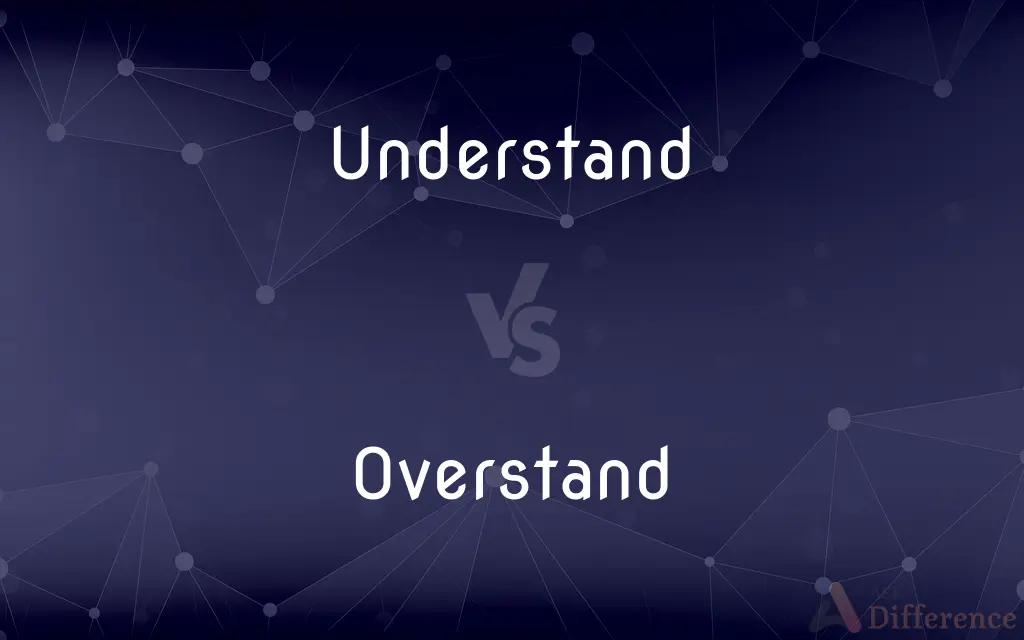Understand vs. Overstand — What's the Difference?
Edited by Tayyaba Rehman — By Maham Liaqat — Updated on March 31, 2024
Understand means to grasp the meaning or logic of something, focusing on intellectual comprehension, whereas overstand, a less common term, implies a deeper or higher level of understanding, often from a spiritual or cultural perspective.

Difference Between Understand and Overstand
Table of Contents
ADVERTISEMENT
Key Differences
Understanding involves comprehending the meaning, significance, or nature of something through intellectual analysis. It's about getting to the heart of a subject by breaking it down into more manageable pieces. Whereas, overstanding suggests a form of understanding that goes beyond the conventional or superficial, aiming for a more profound or elevated perception. This concept is often used in contexts where knowledge transcends the purely intellectual to encompass emotional or spiritual dimensions.
In the process of understanding, one typically employs logical reasoning and critical thinking to make sense of a concept or situation. It's a foundational skill in education and daily life, enabling us to learn from and adapt to our environment. On the other hand, overstanding is often associated with a holistic grasp of situations, emphasizing wisdom and insight gained through experiences rather than just facts learned through study.
Understanding is crucial for effective communication and problem-solving, as it allows individuals to interpret information accurately and apply it in various contexts. Meanwhile, overstanding is sometimes seen as achieving a higher wisdom that connects deeper meanings and truths, often related to personal growth or cultural identity, especially within certain spiritual or philosophical groups.
While understanding is a widely recognized and essential cognitive skill, overstanding is a term used more selectively, primarily within certain cultural or spiritual communities. It implies a surpassing of traditional understanding to achieve a more comprehensive and insightful perspective.
Understanding and overstanding also differ in their application and recognition in educational and professional settings. Understanding is a universally acknowledged objective in these areas, promoting knowledge acquisition and application. In contrast, overstanding, due to its more specialized use, might not be as widely recognized or valued in standard educational or professional frameworks, highlighting a distinction between conventional educational goals and more individualized or spiritual aspirations.
ADVERTISEMENT
Comparison Chart
Definition
Grasping the meaning or logic
Achieving a deeper or higher level of understanding
Context of Use
Widely used in educational, professional, and daily contexts
Primarily used in spiritual or cultural contexts
Focus
Intellectual comprehension
Holistic or elevated perception
Importance in Education
Fundamental in learning and communication
Less emphasized, more individual or community-focused
Associated Skills
Logical reasoning, critical thinking
Insight, wisdom, emotional intelligence
Compare with Definitions
Understand
To grasp the significance, implications, or importance of something.
He understands the risks involved in the procedure.
Overstand
To perceive or acknowledge the interconnectedness of all things.
He overstands how his actions affect the community and the environment.
Understand
To empathize or sympathize with someone.
I understand your frustration with the process.
Overstand
To comprehend or understand something deeply, surpassing basic understanding.
She overstands the cultural significance behind the tradition.
Understand
To comprehend the workings, structure, or logic of something.
She understands complex mathematical concepts easily.
Overstand
To attain a higher level of awareness or wisdom about something.
Through meditation, he seeks to overstand the nature of his thoughts.
Understand
To interpret or view something in a particular way.
He understands their actions as a form of protest.
Overstand
To recognize the broader implications of a situation or concept.
She overstands the environmental impact beyond the immediate effects.
Understand
To perceive the intended meaning of (words, a language, or a speaker).
She understands Spanish better than she speaks it.
Overstand
To grasp the deeper or spiritual meaning beyond the surface.
They overstand the lyrics of the song more than its melody.
Understand
Perceive the intended meaning of (words, a language, or a speaker)
He didn't understand a word I said
She understood what he was saying
He could usually make himself understood
Overstand
Oxford Univ."to be overstanding for honours": to be ineligible for honours in an examination because more than the permitted number of terms (normally twelve) has elapsed since one's matriculation.
Understand
Interpret or view (something) in a particular way
As the term is usually understood, legislation refers to regulations and directives
Overstand
To stand over (formerly especially so as to guard or intimidate); to stand higher than or above.
Understand
Be sympathetically or knowledgeably aware of the character or nature of
I understand how you feel
Picasso understood colour
Overstand
Sailing. To sail past (a line or mark indicating the course of a race) by staying on a tack for too long.
Understand
To become aware of the nature and significance of; know or comprehend
She understands the difficulty involved.
Overstand
And without object. To understand. Now used (especially in Caribbean and African-American usage) to avoid the negative connotations of under, perceived as incompatible with the positive meaning of the verb.
Understand
To become aware of the intended meaning of (a person or remark, for example)
We understand what they're saying.
We just disagree with it. When he began describing his eccentric theories, we could no longer understand him.
Overstand
And without object. Contrasted with understand in other ways, as: to understand more than is necessary or desirable; to analyse excessively; to understand fully.
Understand
To know and be tolerant or sympathetic toward
Hoped that they would understand my complaint.
Overstand
(rare) To stand or insist too much or too long; overstay.
Understand
To know thoroughly by close contact or long experience with
That teacher understands children. I understand the basics of car repair.
Overstand
(transitive) To stand too strictly on the demands or conditions of.
Understand
To learn indirectly or infer, as from hearsay
I understand his departure was unexpected. Am I to understand you are staying the night?.
Overstand
To sail to the mark at a wider angle than is the normal upwind angle, to go beyond the layline
Understand
To assume to be or accept as agreed
It is understood that the fee will be $50.
Overstand
To be neglected and left uncut for too long.
Understand
To supply or add (words or a meaning, for example) mentally
A verb is understood at the end of the statement "Yes, let's.".
Overstand
To have complete or intuitive comprehension of; to understand fully.
Understand
To have understanding, knowledge, or comprehension.
Overstand
(lutherie) The measurement between the top plate and the fingerboard where the neck meets the body of the instrument.
Understand
To have sympathy or tolerance
You're upset. I understand.
Overstand
To stand on the price or conditions of, so as to lose a sale; to lose by an extravagant price or hard conditions.
What madman would o'erstand his market twice?
Understand
To learn something indirectly or secondhand; gather.
Understand
(transitive) To grasp a concept fully in one's mind, especially (of words, statements, art, etc.) to be aware of the meaning of and (of people) to be aware of the intent of.
I'm sorry. I don't understand.
Please try to understand. It's not you, it's me.
Understand
To believe, to think one grasps sufficiently despite potentially incomplete knowledge.
I understand that you have a package for me?
In the imperative mood, the word “you” is usually understood.
Understand
To stand underneath, to support.
Understand
To have just and adequate ideas of; to apprehended the meaning or intention of; to have knowledge of; to comprehend; to know; as, to understand a problem in Euclid; to understand a proposition or a declaration; the court understands the advocate or his argument; to understand the sacred oracles; to understand a nod or a wink.
Speaketh [i. e., speak thou] so plain at this time, I you pray,That we may understande what ye say.
I understand not what you mean by this.
Understood not all was but a show.
A tongue not understanded of the people.
Understand
To be apprised, or have information, of; to learn; to be informed of; to hear; as, I understand that Congress has passed the bill.
Understand
To recognize or hold as being or signifying; to suppose to mean; to interpret; to explain.
The most learned interpreters understood the words of sin, and not of Abel.
Understand
To mean without expressing; to imply tacitly; to take for granted; to assume.
War, then, war,Open or understood, must be resolved.
Understand
To stand under; to support.
Understand
To have the use of the intellectual faculties; to be an intelligent being.
Imparadised in you, in whom aloneI understand, and grow, and see.
Understand
To be informed; to have or receive knowledge.
I came to Jerusalem, and understood of the evil that Eliashib did for Tobiah.
Understand
Know and comprehend the nature or meaning of;
She did not understand her husband
I understand what she means
Understand
Perceive (an idea or situation) mentally;
Now I see!
I just can't see your point
Does she realize how important this decision is?
I don't understand the idea
Understand
Make sense of a language;
She understands French
Can you read Greek?
Understand
Believe to be the case;
I understand you have no previous experience?
Understand
Be understanding of;
You don't need to explain--I understand!
Common Curiosities
What is the key difference between understand and overstand?
Understanding refers to comprehending or grasping the meaning, logic, or significance of something, while overstanding implies a deeper, more profound level of understanding, often with spiritual or cultural dimensions.
Is overstanding a recognized concept in academic settings?
Overstanding is not commonly recognized in academic settings, where emphasis is placed on understanding in its traditional sense.
How can one achieve overstanding?
Achieving overstanding often involves deep reflection, life experience, and an openness to insights beyond conventional wisdom.
Do understand and overstand share any commonalities?
Both involve the process of comprehending or making sense of something, but overstand takes this to a deeper or more elevated level.
How do understand and overstand relate to knowledge and wisdom?
Understanding is related to acquiring knowledge and information, whereas overstanding is more closely related to wisdom and deeper insight.
Can overstanding affect one’s perspective on life?
Yes, achieving overstanding can significantly alter one’s perspective, leading to a more interconnected and profound view of life and its complexities.
Can overstand be used in formal writing?
Overstand is less common and not widely recognized in formal writing outside of specific cultural or spiritual contexts.
Does the concept of overstand have roots in specific cultures or philosophies?
Yes, overstand has roots in and is often used within certain spiritual and cultural philosophies, particularly within Rastafarian culture.
Is overstand a real word?
While overstand is used within certain communities and contexts, it is not widely recognized in standard English dictionaries as a formal term.
Is understanding necessary for overstanding?
Yes, understanding is typically seen as a prerequisite for overstanding, as the latter builds upon the foundational knowledge the former provides.
Can someone overstand without first understanding?
Typically, overstanding builds on the foundation of understanding, making it challenging to achieve without first comprehending the basics.
Can overstanding be taught, or is it an innate ability?
Overstanding is generally considered to be gained through personal growth, experiences, and reflection, rather than being taught in a conventional sense.
In what contexts is overstanding most commonly used?
Overstanding is most commonly used in spiritual, cultural, or philosophical discussions, emphasizing a deeper level of insight.
Is there a limit to overstanding?
Overstanding, by its nature, suggests an ongoing process of deepening insight and wisdom, implying that there is always more to learn and comprehend beyond current understanding.
How does one transition from understanding to overstanding?
This transition involves deepening one’s insight beyond the surface level, often through personal experience, reflection, and a broader perspective on interconnectedness.
Share Your Discovery

Previous Comparison
Helicopter vs. Helo
Next Comparison
Yuppers vs. YesAuthor Spotlight
Written by
Maham LiaqatEdited by
Tayyaba RehmanTayyaba Rehman is a distinguished writer, currently serving as a primary contributor to askdifference.com. As a researcher in semantics and etymology, Tayyaba's passion for the complexity of languages and their distinctions has found a perfect home on the platform. Tayyaba delves into the intricacies of language, distinguishing between commonly confused words and phrases, thereby providing clarity for readers worldwide.















































